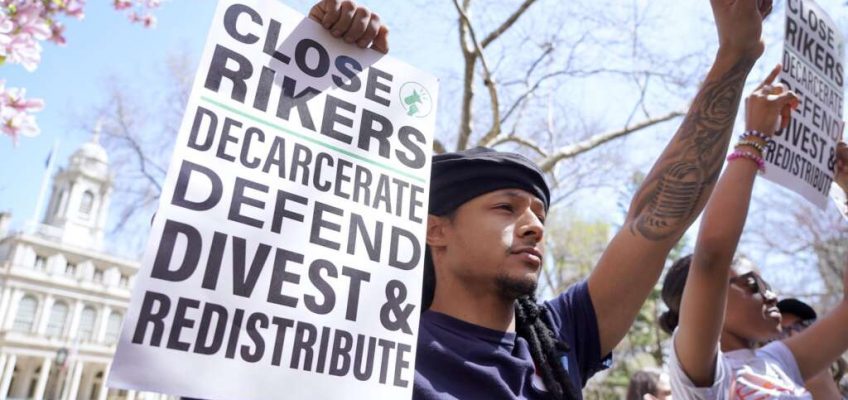“We need a mayor who knows that in a city committed to seeing all of us thrive, there is no place for Rikers Island.”
A rally calling for the closure of Rikers Island in 2023. (Gerardo Romo / NYC Council Media Unit)
It’s clear that New Yorkers want safety, and it will be important in this year’s mayoral election. But how can we tell which candidates are serious about safety, and which ones care more about stoking our fears than investing in what works?
To start with, any candidate who is not committed to closing Rikers is not serious about safety. Rikers Island is a violence incubator that detains legally innocent people largely on the basis of wealth. If that sounds exaggerated, consider that Anthony Martin Jr., a correction officer, is at liberty while he faces charges of raping a woman in Queens (he is also named in civil lawsuits by two incarcerated women), but 31-year-old Joshua Valles died after suffering a cracked skull at Rikers while facing non-violent felony charges. Joshua Valles couldn’t pay $10,000 for his freedom, but Anthony Martin paid his bail immediately.
Rikers also wastes tremendous resources—over $2.8 billion dollars a year—that we desperately need for housing, healthcare, education, and other resources that strengthen our communities.
Maybe worst of all, Rikers is a place to hide our city’s problems rather than solving them, with the terrible effect of making these problems worse. When people with mental health needs are sent to Rikers (as thousands are each year), they are disconnected from any community-based care they’re receiving, and subjected to practices like “deadlocking.”
The thousands of people admitted to Rikers each year who are homeless can lose their spot on the waitlist for supportive housing. People who have stable housing can lose that too, along with their jobs, during even a short jail stay.
It’s not surprising then that being detained at Rikers actually increases the likelihood that a person will be re-arrested. On average, 33 percent of people released from Rikers return within one year, compared to alternative-to-incarceration programs like Bronx Connect, which sees 97 percent of graduates with no new felony convictions after three years, or Justice Involved Supportive Housing, which has substantially reduced jail and shelter stays for the lucky few who’ve been able to get one of these units.
Anyone who is serious about safety should be telling voters that they will fund more Intensive Mobile Treatment teams for the hundreds of people who have qualified for them but are waiting for a placement; that they will ensure that everyone who needs supportive housing can get it; and that they will fund and encourage judges to make better use of New York’s highly-effective network of alternative to incarceration programs—all of which operate at less than one-tenth the per-person cost of Rikers.
Voters should be skeptical of any candidate who won’t fully commit to these proven solutions, but will rail against “recidivism” and pledge to arrest more people who have spiraled into crisis while waiting to access services.
While Rikers should have closed long ago, avoidable delays have put the borough-based jails to replace it far behind schedule. Still, there are actions the next mayor can, and must, take to shorten this timeline. The Independent Rikers Commission identified ways to speed up jail construction by at least a year, and candidates should commit to doing so.
Infrastructure, however, is just one part of the close Rikers plan—shrinking the jail population is the other. Mayoral candidates should be telling us that they will bring down the jail population in alignment with the Close Rikers plan by August 31, 2027, regardless of whether the borough jails are finished. Doing that would enable the closure of several Rikers jails, even if some remain open while the borough jails are completed. Having fewer people in Rikers is also the surest and fastest way to prevent it from claiming more of our neighbors’ lives.
Finally, any candidate who says they will stand up to the Trump administration cannot share its disregard for constitutional rights. More than 80 percent of people at Rikers have not been convicted. Describing them as dangerous or guilty of anything before they’ve had their day in court is a page out of Trump’s playbook.
When NYPD Commissioner Jessica Tisch refers to people as “offenders,” “prisoners,” or “perps” based solely on an arrest, as she did in her State of the NYPD address, she displays either her lack of understanding of the legal system, or her contempt for the presumption of innocence that is at its foundation. Either one should be a red flag to all New Yorkers, and to any candidate considering keeping her on as commissioner.
The truth is that the dehumanization of people held at Rikers starts far before they cross the “Bridge of Pain.” It starts in our communities, where we are denied the resources we deserve and then punished in our struggle to survive, and it continues in a court system that comfortably treats us as guilty because it presumes that our lives are of no importance anyways.
We need a mayor who knows that in a city committed to seeing all of us thrive, there is no place for Rikers Island.
Darren Mack is co-director of Freedom Agenda, and a survivor of Rikers. Melissa Mark-Viverito is the former Speaker of the New York City Council.
The post Opinion: NYC Needs a Mayor Who is Serious About Safety appeared first on City Limits.


Leave a Reply